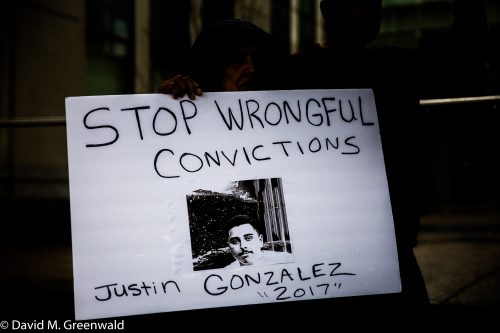
Yesterday I read an op-ed in the Cleveland newspaper where the head of the Innocence Project of Ohio, Mark Godsey, praised the Cuyahoga County Prosecutor for an exoneration.
Mr. Godsey credits the prosecutor and his office’s Conviction Integrity Unit “with doing much of the work to exonerate Ru-El Sailor in a 2002 slaying for which he’s spent the last 15 years in prison.”
I wish I could write a similar letter of praise for Yolo County’s DA, but our recent records request shows the Yolo County Conviction Integrity Unit has been asked to look at six cases and chosen to take none of them to the next level.
This past weekend, I was asked to speak at a benefit for Justin Gonzalez, as his family seeks to raise money and awareness for their son’s believed wrongful conviction this past December. At that benefit, I told the audience that the Vanguard has identified at least 14 cases of Yolo County wrongful convictions since 2006 – all of them either under DA Jeff Reisig’s watch or, in the case of the so-called Halloween Homicides, prosecuted personally by Mr. Reisig.
Mr. Godsey writes, “It might seem to those unfamiliar with how wrongful conviction cases work that once evidence surfaces of the innocence of someone wrongfully imprisoned, prosecutors just agree to freedom, like we see on television shows or in movies. But unfortunately, too often that is not the case.
freedom, like we see on television shows or in movies. But unfortunately, too often that is not the case.
“For those of us who do innocence work, we see case after case where prosecutors presented with evidence of a wrongful conviction resist that evidence. They dig in and refuse to admit a mistake no matter how great the showing of innocence. This is because prosecutors are human.”
This has unfortunately been our experience in Yolo County.
As has this: “Even when presented with new evidence of innocence, prosecutors often remain doubtful. And prosecutors are often subject to enormous professional and political pressures, as well as public opinion, that can influence how claims of wrongful convictions are investigated and addressed.”
The case of Justin Gonzalez is itself a good case study for what goes wrong in the system. As more and more data accumulates on wrongful convictions, researchers have identified patterns of causality. We see faulty or flawed eyewitness identification, informant testimony and prosecutorial misconduct as key causes.
In the case of Justin Gonzalez, one key witness failed to identify Justin Gonzalez as being at the scene of the murder – until she actually took the stand. But more important was the testimony of Ruby Aradoz, who flipped in her testimony in an apparent effort to avoid prosecution herself.
In her prior sworn testimony, she never testified that she saw Mr. Gonzalez with a knife. This was the testimony she gave at the Grand Jury. But that changed at trial. Suddenly she saw Justin Gonzalez with a knife, and, while she may have been thoroughly discredited by the defense, the jury really only had her testimony to go on.
The most troubling aspect of the case is that Deputy DA Michael Vroman and Co-Counsel Jeff Reisig seemed to have misled the defense as to what Aradoz would testify to. Mr. Vroman represented to the defense that Ms. Aradoz would only testify to what she had testified to previously. The problem is that she had previously given at least three different versions of what happened.
Had the defense had access to the police investigators’ videoed interview of Ms. Aradoz, they might have seen this coming. But this was withheld – Judge Dan Maguire ruling unintentionally – from the defense.
One point I made is that, while I fully believe the prosecutor is the most powerful person in the courtroom – they have the ability to determine who is charged with a crime and what to charge them with – we let judges here in Yolo County off the hook in the rare times and instances when they do have discretion.
A key point was that, in my eight years of running the court watch program, I have rarely seen a judge rule against a prosecutor on majors issues. They rarely suppress evidence, almost never dismiss cases, and only once – in the Eric Lovett case – have I seen them overturn a jury verdict to grant a new trial.
Judge Overturns 2016 Lovett Conviction Based on New Court Decision
Last week, we saw the case of Joseph Hernandez. Judge David Reed, an otherwise fair judge, a former defense attorney, issued a 93-year sentence in a burglary case. I argued that the idea that someone who commits a bunch of burglaries should effectively serve life without parole is ABSURD.
But, while the DA asked for the lengthy sentence, Judge Reed had the ability to issue a more reasonable verdict. Judge Reed declined a motion for new sentencing on the grounds of 8th Amendment claims that de facto life sentence was cruel and unusual punishment..
Moreover, had he simply agreed to strike the prior strike, the defendant as a youthful offender not only would have had his sentence cut in half but would have been eligible for a parole hearing in five years.
Instead, we see the lengthy 93-year sentence that does not appear to fit the crime.
Likewise, in the Justin Gonzalez case, Judge Maguire could have done the right thing. In a motion for a new trial, Judge Maguire weighed the evidence and decided that, even if the defense had this information, they had so discredited Ms. Aradoz that it would have made no difference if the defense had this information.
Judge Maguire acknowledged that he was troubled to be holding a DVD to which the defense didn’t have access. But, at the same time, he declined to invalidate the verdict of the jury because he believed it would have made no difference.
As I stated on Saturday, my question: how does he know? And shouldn’t we err on the side of innocence and a new trial when we are talking about locking someone up for 90 years to life?
The problem is not just the DA’s office but also the judges who do not provide a check against DA aggressiveness and lack of ethics.
However, the DA plays the biggest role here, even if judges in this county should do more to counter-balance the prosecutor.
The Cleveland case shows just how powerful the role of prosecutor actually is. The key to the Sailor case is that Mr. O’Malley’s office did a very thorough investigation after the evidence of a possible wrongful conviction was brought to his attention by the defense team.
Mr. Godsey writes that “it was O’Malley’s office, and not the defense team, who found the key witnesses and took the statements that were instrumental to exonerating Sailor.”
That has not happened in the Justin Gonzalez case. The DA has to know that the evidence against Mr. Gonzalez is sketchy at best, and that Ms. Aradoz was unbelievable. But, instead of allowing the judge to allow a jury reconsider the case and the evidence, they fought hard against a new trial – and persisted.
There is evidence of additional witnesses that could shed light on Mr. Gonzalez’s questionable role in the killing, but the DA’s office is not interested in pursuing them.
Jeff Reisig catapulted himself into office on the strength of the Halloween homicide convictions of James Olague and Oscar Cervantes, who, along with Ernesto Arellano, may have been wrongly convicted. Now he is attempting to get re-elected and using the Woodland Casa Del Sol conviction as a feather in his case for reelection.
Mr. Reisig has often been accused of valuing convictions over the truth and justice, and the Gonzalez conviction is just the latest example.
—David M. Greenwald reporting






